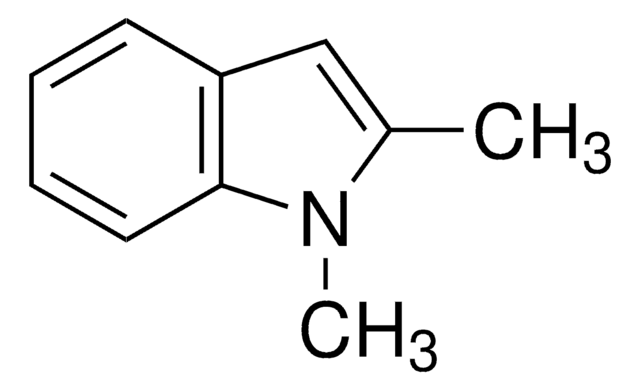120812
2,3-Dimethylindole
≥97%
Synonyme(s) :
NSC 24936
About This Item
Produits recommandés
Pureté
≥97%
Forme
solid
Point d'ébullition
285 °C (lit.)
Pf
105-107 °C (lit.)
Chaîne SMILES
Cc1[nH]c2ccccc2c1C
InChI
1S/C10H11N/c1-7-8(2)11-10-6-4-3-5-9(7)10/h3-6,11H,1-2H3
Clé InChI
PYFVEIDRTLBMHG-UHFFFAOYSA-N
Application
- Bis(indolyl)methane derivatives
- Potent opioid receptor agonists
- Photorefractive materials
- Prodrugs of the cyclin-dependent kinase (CDK) inhibitor Alsterpaullone
- Dopamine receptors 2/4 (D2/D4) antagonists
- Useful azaspirocyclic building blocks
Reactant for:
- Baylis-Hillman reactions
- Photosensitized Diels-Alder reactions
- Photoinduced electron transfer reactions
Code de la classe de stockage
11 - Combustible Solids
Classe de danger pour l'eau (WGK)
WGK 3
Point d'éclair (°F)
Not applicable
Point d'éclair (°C)
Not applicable
Équipement de protection individuelle
Eyeshields, Gloves, type N95 (US)
Certificats d'analyse (COA)
Recherchez un Certificats d'analyse (COA) en saisissant le numéro de lot du produit. Les numéros de lot figurent sur l'étiquette du produit après les mots "Lot" ou "Batch".
Déjà en possession de ce produit ?
Retrouvez la documentation relative aux produits que vous avez récemment achetés dans la Bibliothèque de documents.
Les clients ont également consulté
Notre équipe de scientifiques dispose d'une expérience dans tous les secteurs de la recherche, notamment en sciences de la vie, science des matériaux, synthèse chimique, chromatographie, analyse et dans de nombreux autres domaines..
Contacter notre Service technique









